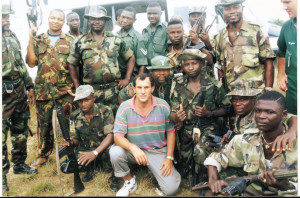“I set out to save lives and have ended up collecting the dead. Somewhere along the line, I lost sight of treating people and became obsessed with my own grandiose ideals of service.”
Reading Emergency Sex (and Other Desperate Measures) was extremely eye-opening. I think that we can learn about the aid sector in class and have meaningful discussions, but reading about first-hand accounts sheds an entirely new light on this line of work.
Throughout reading this book, I was very intrigued by Ken’s journey particularly. He came into the humanitarian sector with a naïve perception about what this work would be like, and throughout the book begins to realize that he could only do so much as one person. Ken is a white male who was studying at Harvard Law School. He appears to have had privilege handed to him and is aware that he has a lot to learn while going into humanitarian work. It is apparent throughout the book that he does gain a large amount of respect from fellow workers, probably stemming from his demographics, especially being a white male (Arcaro).
Starting off in Cambodia, Ken appears to be enjoying life and the work that he is doing. He is meeting new people, drinking, and hosting parties. He seemed to believe that all of his missions would end like this and refers back to this success several times throughout the book as he experiences less successful missions and the tragedies of war. His privilege beforehand appears to account for some of his preconceived notions. Going from Cambodia to Somalia, Ken experiences more truth to what this work really looks like. After being caught in crossfire in Somalia and losing 18 Somalis in the process, he says “Why am I taking this all so personally? […] How many successful peacekeeping missions will never be sent now? How many lives could we have saved that will be lost now? (172). This sense of hope that Ken had at the beginning of the book slowly starts eroding as he experiences the violence and realities of humanitarian aid. Later on in the book he travels to Rwanda post-genocide and gets to see first hand the terrors that occurred there and the lack of aid that was given by the UN. He explains that he was “hell-bent on being an effective humanitarian in Cambodia and Somalia” but now his “naïve fog” is finally lifting (219).
“We weren’t the first, and we won’t be the last, to venture forth overseas with grand ideas,” (289).
Ken’s moral journey throughout the book followed a clear path of the idea of the moral career presented in “Mission, Mercenary, Mystic, Misfit.” This idea of a “moral career” was presented by Erving Goffman and is “the regular sequence of changes that career entails in the person’s self and in his imagery for judging himself and others.” Our identity is in fact, in flux and depends on the social context in which we are in, (Arcaro). Several accounts from this book reflect similar attitudes as Ken. He sets out to be a missionary in this field and to make the world a better place. He wanted to “harness the power of an ascendant America to personally undo the Holocaust,” (289). However, somewhere along the way, amidst the realities of the lives he was affecting, he realized that this was much bigger than one person and started to see this bigger picture, especially after his near-death experience in Somalia. The next stage, becoming a mystic, can be seen as he decides to go to Rwanda. He becomes cause-oriented and knows the challenges he faced in Somalia and the truths about the aid sector but still chooses to go. Lastly, becoming a misfit, he uses his “not from here” status as an excuse to see everything clinically but yet still have a way to leave, as he left Rwanda, (J.). Ken’s journey comes to an end as he is more aware of himself and of the aid sector. He came in with a naïve sense of hope but slowly realized that he personally could not win a war or restore order, thus weakening his faith in humanity.
Arcaro, Tom. The Impact of Gender on the Lives of Aid Workers. 15 Nov. 2015, blogs.elon.edu/aidworkervoices/?p=360.
Arcaro, Tom. The Moral Career of a Humanitarian Aid Worker. 25 Jan. 2016, blogs.elon.edu/aidworkervoices/?p=414.
Cain, Kenneth, Heidi Postlewait, and Andrew Thomson. Emergency Sex and Other Desperate Measures: A True Story from Hell on Earth. New York: Hyperion, 2004. Print.
J. Missionary, Mercenary, Mystic, Misfit. Evil Genius Publishing, 2013. Print.


2 Comments
I also wrote about Ken’s journey and agree with what you wrote. He had a very clear path through the mission, mercenary, mystic, misfit and moral career idea. You had a good use of quotes and I think they helped make your point very well. I also liked how you described each mission prior to talking to about his moral journey.
I think you do a great job of setting up your blog post by describing how Ken came into the aid sector both idealistically and in regards to his identity. I also think that you picked some incredibly powerful quotes to go along with your own thoughts; they capture what you are saying and Ken’s own personal beliefs very well. Finally, you do a great job of describing Ken’s moral career in his various roles throughout the book. In particular, I enjoy how you marked each transition with a new country/mission.